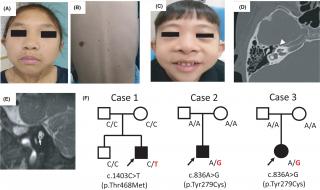Mar, 2022

LEOPARD syndrome (OMIM #151100), also referred to as Noonan syndrome with multiple lentigines, is characterised by various congenital defects, including Lentigines, Electrocardiographic conduction (or other cardiac) abnormalities, Ocular hypertelorism, Pulmonary stenosis, Abnormalities of genitalia, Retarded growth and Deafness. The disease is inherited in an autosomal dominant manner, with the pathogenic variant either inherited from an affected parent or occurring de novo in a patient without any family history. Sensorineural hearing impairment (SNHI), ranging from mild to profound in severity, has been documented in approximately 15%–20% of patients with LEOPARD syndrome.1 There still is inadequate literature regarding the surgical indications and postoperative outcomes of cochlear implantation (CI) in patients with LEOPARD syndrome; therefore, the aim of this study was to investigate whether CI surgery improved the hearing and speech performance of three children with LEOPARD syndrome-related SNHI.